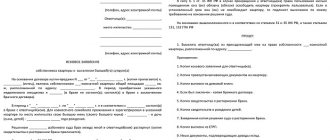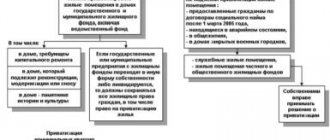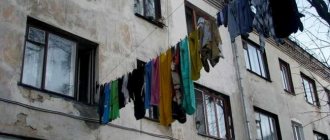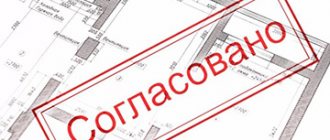When a child necessarily participates in privatization
- If the child is not registered in a municipal apartment, but one of his parents is registered.
- If the child was registered in the apartment, but he was discharged and registered in another place.
- If the child and his parent have been discharged from the municipal apartment and registered elsewhere.
- The parent who is registered in the apartment will formalize a refusal to participate in the privatization. It does not matter whether the child was registered or not.
Explanation: Clause 2 Art. 20 of the Civil Code of the Russian Federation - “The place of residence of minors is the place of residence of their legal representatives - parents, adoptive parents or guardians.” In simple words, according to the law, a child from birth receives the right to live with his parents. As a child, he has the right to use a municipal apartment in which one of his parents is registered.
A child under 18 years of age does not independently determine where to live. This is determined for him by his parents/guardians - Art. 54, art. 55 and art. 63 RF IC. Since a child cannot independently exercise his housing rights (determine his place of residence), he cannot lose the right to use a municipal apartment, even when he was discharged from it (separately or together with his parent).
Art. 7 of the Law on Privatization dated 04.07.1991 N 1541-1 - “The contract for the transfer of residential premises into ownership includes minors who have the right to use this residential premises and live together with persons to whom this residential premises is transferred into common ownership with minors, or minors, living separately from these persons, but who have not lost the right to use this residential premises.” In simple words, a child must participate in privatization, even if he is not registered in the apartment, but one of his parents is registered in it.
Privatization of an apartment with a minor child - basic rules
- If only children who have not yet reached the age established by legislative acts for independent participation in the transaction live in the privatized residential premises , then this real estate is transferred to them based on the consent of their parents, guardians or adoptive parents. It is worth remembering that such a procedure will also require the consent of the guardianship authority.
- If the children's parents have died , then, according to the existing application from the current guardianship authority, this property must also be transferred into full ownership of the children within a full 3 months. And if the minor is currently over 14 years old, then he will have to draw up such an agreement on his own, guided by the permission and assistance of the relevant guardianship authority.
- For a minor, there is also a limitation in the generally accepted rule that privatization of residential premises is possible only once in a lifetime. Children who have become full owners of residential premises through privatization have the full right to privatize real estate after they reach adulthood.
Initially, the legislative act under which the entire process of privatization of residential premises was carried out did not contain such a norm, thus grossly violating all the rights of a minor. Only later, in 1994, were separate amendments made that began to protect the interests and rights of minors.
We recommend reading: If there is no will, how to divide the inheritance
When can you privatize an apartment without a child?
- If the child has never been registered in a municipal apartment, and his parent was discharged before privatization and will not participate in it.
Instructions on how to leave the apartment. When an adult citizen independently checks out of a municipal apartment, he voluntarily renounces the right to live in it and loses it from the moment of checkout. And once a citizen loses the right of residence, his child also loses this right - according to the logic of the above paragraph 2 of Art. 20 Civil Code of the Russian Federation. This is indicated in paragraph 3 of Art. 83 of the Housing Code of the Russian Federation - “If the tenant and members of his family leave for another place of residence, the social rental agreement for residential premises is considered terminated from the date of departure.” Also in Art. 7 of the Law on Privatization dated 04.07.1991 N 1541-1 - “The contract for the transfer of residential premises into ownership includes minors who have the right to use this residential premises and live together with persons to whom this residential premises is transferred into common ownership with minors, or minors, living separately from these persons, but who have not lost the right to use this residential premises.” - If the child has never been registered in a municipal apartment, and his parent was discharged by court decision.
Here it is the same as in the first case, only the parent and child lose the right from the moment the court decision enters into force - Art. 209 and Art. 210 Code of Civil Procedure of the Russian Federation. - If the parent left the apartment before the birth of the child or was discharged by court decision. This is similar to the situations above.
How to privatize a municipal apartment and what documents to collect.
Rights and participation of minors
Errors in legislation in the early 90s led to massive violations of the civil rights of children - most real estate transactions were carried out to the detriment of their interests. That is why special attention is paid today to the participation of minors in the program for the transfer of state and municipal housing.
A child under 18 years of age is automatically included in the number of shareholders of the premises . Thus, if a minor is registered in an apartment, the adult owner cannot become its sole owner, despite the fact that other family members have refused to participate in the procedure. This can be done without any problems after the children are discharged.
Since the law does not establish the possibility of refusal in favor of a specific person, the entire living space in this case will be divided into two equal shares: ½ share will go to the parent, ½ share to the child. If there are two minor children, then each of the participants (children and parent) will receive their third. Every child over 14 years of age must be present with adult family members when submitting an application and sign a personal consent to the privatization of housing.
There are cases when a registered minor is required to waive equity participation. For example, a child lives with his grandmother, recently took part in the privatization of her square meters and is the owner of ½ share. In this situation, it will be necessary to obtain permission from the guardianship and trusteeship authorities to refuse the child, since repeated participation in the procedure is possible only when he reaches the age of 18 years.
In other cases, it is almost impossible to obtain such permission - social services suppress possible attempts to violate children's rights. In past years, the interests of children were rarely taken into account during the privatization of housing; their entry into shared ownership was poorly controlled, which led to disputes and litigation between relatives.
Extensive judicial practice has made it possible to approve the rule of civil law, in accordance with which decisions are made to initiate enforcement proceedings. Today, the Supreme Court of the Russian Federation considers contracts for the transfer of residential premises through privatization, concluded in violation of the rights of the child, as partially voidable transactions. This means that the injured party, having learned about the violation of its rights to privatization, can go to court, regardless of how much time has elapsed since the conclusion of the contract.
There are precedents when, years later, grown-up children filed lawsuits to restore their rights to part of the property.
Lawyers who periodically encounter such cases recommend that when purchasing real estate on the secondary market, you carefully read the documents on privatization, if it was carried out in the early 90s, to check for the participation of minors.
As a full-fledged subject of the privatization program, a minor can be the sole owner of the privatized apartment. Federal legislation allows for the possibility of registering a social rental facility as the full property of the child, provided that there are no other registered persons.
Similar situations often arise after the death of relatives (grandparents) who registered their grandchildren in their living space. This is a reasonable measure that allows you to “assign” housing to your family if an elderly relative for some reason refuses to privatize the property, and there is a risk that after his death the square meters will go to the state. Do you want to know what is the list of documents for the privatization of an apartment or how the privatization of an apartment with children proceeds? Find out by following the links.
You can find out the debt from the bailiff by following a few tips. Find out about them here.
By going to https://lawyer-consult.ru/administrative/oformlenie-dokumentov/kak-pomenyat-familiyu.html, you will learn how to change your last name in your passport.
Can a child refuse privatization?
If parents want their child to refuse to participate in privatization, they need to obtain permission from guardianship and trusteeship. Without permission, they will not draw up a privatization agreement, because the child is waiving his rights. Clause 2 Art. 37 of the Civil Code of the Russian Federation and clause 1 of Art. 21 of the Federal Law on Guardianship - “The guardian does not have the right, without the prior permission of the guardianship and trusteeship authority, to carry out, and the trustee does not have the right to consent to, transactions for the alienation, including the exchange or donation of the ward’s property, leasing it (lease), for free use or as collateral, transactions entailing the renunciation of the rights belonging to the ward, the division of his property or the allocation of shares from it, as well as any other actions entailing a decrease in the property of the ward.”
Naturally, the guardianship authorities will not give permission, because if the child refuses privatization, an infringement of his rights is revealed. According to the law, the child’s parents must protect his rights, but here the opposite happens. Clause 1 Art. 64 of the RF IC - “Parents are the legal representatives of their children and act in defense of their rights and interests in relations with any individuals and legal entities, including in the courts, without special powers.”
Privatization of an apartment with minor children: documents
Privatization is a procedure for transferring real estate into private hands, which involves registration of ownership. Privatization of an apartment with minor children is a complex process that has a number of features and nuances. Often, difficulties arise due to ignorance of the legislative norms relating to this process, because the procedure requires strict compliance with them.
- statements from all participants,
- social tenancy agreement,
- photocopies of passports,
- Photocopies of birth certificates will be required (for children under 14 years old),
- official consent of the guardianship authorities,
- technical and cadastral passports,
- certificate or extract from the house register,
- documents confirming that participation in privatization processes has not previously been carried out,
- documentation confirming the complete absence of debts on utility bills,
- notarized consents from persons wishing to refuse to participate in privatization,
- power of attorney for representing the interests of representatives of minors, certified by a notary.
We recommend reading: How to register a house built without a building permit
Child’s participation in collecting documents
If the child is under 14 years old, his presence is not required anywhere. One of the parents/guardian must do everything for him - collect the necessary documents, sign the privatization agreement and submit it for registration - Art. 28 Civil Code of the Russian Federation. If he is between 14 and 18 years old, he and his parent must collect documents, sign applications and a privatization agreement - Art. 26 Civil Code of the Russian Federation.
If you have questions, you can consult for free. To do this, you can use the form below, the online consultant window and telephone numbers (24 hours a day, seven days a week): 8 Moscow and region; 8 (812) 425-62-89 — St. Petersburg and region; all regions of the Russian Federation.
Features of privatization with minor children
- if they are, then the child has the right to participate in the privatization of any of the parental apartments, especially the one where he is registered;
- In case of divorce, the child’s place of residence is determined by the court or by agreement of the parents, where he can also become a participant in privatization.
- Up to 14 years old, or minors. They do not have the opportunity to make independent transactions; their parents or guardians do this for them.
- Minors 14-18 years old. They already have a little more rights, but their transactions require the approval of parents or guardianship authorities.
- Capable emancipated citizens 16-18 years old. Emancipation, in this case, is a legal term meaning that, despite their earlier age, these people can already independently participate in civil circulation.










